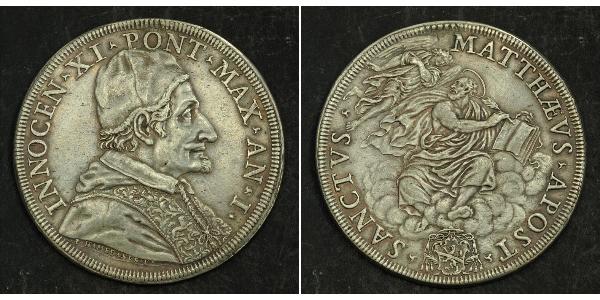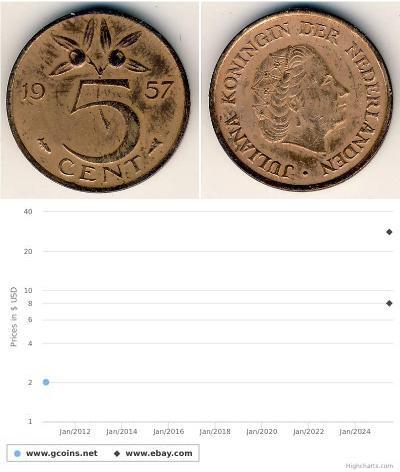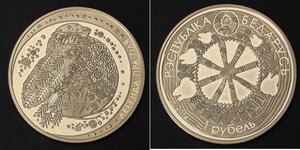(Venduta per $1425.0)
1689, Vatican, Pope Innocent XI. Large Silver Piastra (80 Bolognini) Coin. RR!
Mint Year: 1677
Mint Place: Rome
Denomination: Piastra (80 Bolognini)
Reference: Muntoni 42, Davenport 4086, CNI 12, KM-393. R!
Condition: Nicely removed suspension loop, tiny marks and scratches in fields, otherwise about XF!
Weight: 31.98gm
Diameter: 45mm
Material: Silver
Obverse: Caped and mantled bust of the Pope right. Designer´s signature (I. HAMERANVS F.) inside bust truncation.
Legend: . INNOCEN . XI PONT . MAX . AN . I .
Reverse: Saint Matthew inspired by an angel to which he looks, seated in clounds, inscribing his evangelium.
Legend: MATTH[AE]VS . APOST . - . SANCTVS .
Matthew the Apostle (Hebrew: מַתִּתְיָהוּ Mattithyahu or מתי Mattay, "Gift of YHVH"; Greek: Ματθαῖος Matthaios; also known as Saint Matthew and as Levi) was, according to the Bible, one of the twelve apostles of Jesus and, according to Christian tradition, one of the four Evangelists.
Among the early followers and apostles of Jesus, Matthew is mentioned in Matthew 9:9 and Matthew 10:3 as a publican who, while sitting at the "receipt of custom" in Capernaum, was called to follow Jesus. Matthew may have collected taxes from the Hebrew people for Herod Antipas. ] Matthew is also listed among the twelve, but without identification of his background, in Mark 3:18, Luke 6:15 and Acts 1:13. In passages parallel to Matthew 9:9, both Mark 2:14 and Luke 5:27 describe Jesus' calling of the tax collector Levi, the son of Alphaeus, but Mark and Luke never explicitly equate this Levi with the Matthew named as one of the twelve.
Authenticity unconditionally guaraneed.
Pope Innocent XI (Latin: Innocentius XI; 16 May 1611 – 12 August 1689), born Benedetto Odescalchi, was Pope from 21 September 1676 to his death in 1689. He is known as the "Saviour of Hungary".
Much of his reign was concerned with tension with Louis XIV of France. A conservative, he lowered taxes in the Papal States during his pontificate and he also produced a surplus in the papal budget. Because of this surplus he repudiated excessive nepotism within the church. Innocent XI was frugal in matters of governing the Papal States, from dress to leading a life with Christian values. Once he was elected to the papacy, he applied himself to moral and administrative reform of the Roman Curia. He abolished sinecures and pushed for greater simplicity in preaching as well as greater reverence in worship—requesting this of both the clergy and faithful.
After a difficult cause for canonization, starting in 1791, which caused considerable controversy over the years and stopping on several occasions, he was beatified with no opposition in 1956 by Pope Pius XII.
Benedetto Odescalchi was born at Como on 16 May 1611, the son of a Como nobleman, Livio Odescalchi, and Paola Castelli Giovanelli from Gandino. His siblings were Carlo, Lucrezia, Giulio Maria, Constantino, Nicola and Paolo. He is also a relative of his sister's grandson Baldassare Erba-Odescalchi and is a relative of Carlo Odescalchi and Benedetto Erba Odescalchi. In 1626 his father died, and Benedetto began schooling in human sciences taught by the Jesuits at his local college, before transferring to Genoa. In 1630 he narrowly survived an outbreak of plague, which killed his mother.
The Odescalchi family, although only of minor nobility, were nevertheless determined entrepreneurs. In 1619, Benedetto's brother founded a bank with his three uncles in Genoa which quickly grew into a successful money-lending business. After completing his studies in grammar and letters, the 15-year-old Benedetto moved to Genoa to take part in the family business as an apprentice. Lucrative economic transactions were established with clients in the major Italian and European cities, such as Nuremberg, Milan, Kraków, and Rome.
Some time between 1632 and 1636, Benedetto decided to move to Rome and then Naples in order to study civil law. This led to securing the offices of protonotary apostolic, president of the apostolic chamber, commissary of the Marco di Roma, and governor of Macerata; on 6 March 1645, Pope Innocent X (1644–55) made him Cardinal-Deacon with the deaconry of Santi Cosma e Damiano. He subsequently became legate to Ferrara. When he was sent to Ferrara in order to assist the people stricken with a severe famine, the Pope introduced him to the people of Ferrara as the "father of the poor."
n 1650, Odescalchi became bishop of Novara, in which capacity he spent all the revenues of his see to relieve the poor and sick in his diocese. With the permission of the pope he resigned as bishop of Novara in favor of his brother Giulio in 1656 and went to Rome. While there he took a prominent part in the consultations of the various congregations of which he was a member.
Odescalchi was a strong papal candidate after the death of Pope Clement IX (1667–69) in 1669, but the French government rejected him (using the now-abolished veto). After Pope Clement X (1670–76) died, Louis XIV of France (1643–1715) again intended to use his royal influence against Odescalchi's election. Instead, believing that the cardinals as well as the Roman people were of one mind in their desire to have Odescalchi as their Pope, Louis reluctantly instructed the French party cardinals to acquiesce in his candidacy.
On 21 September 1676, Odescalchi was chosen to be Clement X's successor and took the name of Innocent XI. He chose this name in honour of Pope Innocent X, who made him a cardinal in 1645. He was formally crowned as pontiff on 4 October 1676 by the protodeacon, Cardinal Francesco Maidalchini.
Immediately upon his accession, Innocent XI turned all his efforts towards reducing the expenses of the Curia. He passed strict ordinances against nepotism among the cardinals. He lived very parsimoniously and exhorted the cardinals to do the same. In this manner he not only squared the annual deficit which at his accession had reached the sum of 170,000 scudi, but within a few years the papal income was even in excess of the expenditures. He lost no time in declaring and practically manifesting his zeal as a reformer of manners and a corrector of administrative abuses. Beginning with the clergy, he sought to raise the laity also to a higher moral standard of living. He closed all of the theaters in Rome (considered to be centers of vice and immorality) and famously brought a temporary halt to the flourishing traditions of Roman opera. In 1679 he publicly condemned sixty-five propositions, taken chiefly from the writings of Escobar, Suarez and other casuists (mostly Jesuit casuists, who had been heavily attacked by Pascal in his Provincial Letters) as propositiones laxorum moralistarum and forbade anyone to teach them under penalty of excommunication. He condemned in particular the most radical form of mental reservation (stricte mentalis) which authorised deception without an outright lie.
Personally not unfriendly to Miguel de Molinos, Innocent XI nevertheless yielded to the enormous pressure brought to bear upon him to confirm in 1687 the judgement of the inquisitors by which sixty-eight quietist propositions of Molinos were condemned as blasphemous and heretical.
Innocent XI was an enthusiastic initiator of the Holy League which brought together the German Estates and King John III of Poland who in 1683 hastened to the relief of Vienna which was being besieged by the Turks. After the siege was raised, Innocent XI again spared no efforts to induce the Christian princes to lend a helping hand for the expulsion of the Turks from Hungary. He contributed millions of scudi to the Turkish war fund in Austria and Hungary and had the satisfaction of surviving the capture of Belgrade, 6 September 1688.
The pope showed a degree of sensitivity in his dealings with the Jews within the Italian States. He compelled the city of Venice to release the Jewish prisoners taken by Francesco Morosini in 1685. He also discouraged compulsory baptisms which accordingly became less frequent under his pontificate; but he could not abolish the old practice altogether.
More controversially on 30 October 1682 he issued an edict by which all the money-lending activities carried out by the Roman Jews were to cease. Such a move would incidentally have financially benefitted his own brothers who played a dominant role in European money-lending. However ultimately convinced that such a measure would cause much misery in destroying livelihoods, the enforcement of the edict was twice delayed.
Innocent was an enthusiastic initiator of the Holy League which brought together the German Estates and King John III of Poland who in 1683 hastened to the relief of Vienna which was being besieged by the Turks. After the siege was raised, Innocent again spared no efforts to induce the Christian princes to lend a helping hand for the expulsion of the Turks from Hungary. He contributed millions of scudi to the Turkish war fund in Austria and Hungary and had the satisfaction of surviving the capture of Belgrade, 6 September 1688.

1 Scudo Stato Pontificio (752-1870) Pap ...
il gruppo ha 35 monete / 35 prezzi
Add coin to this group
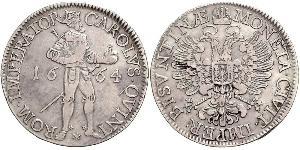
1 Thaler Francia medioevale (843-1791) A ...
il gruppo ha 12 monete / 11 prezzi
Add coin to this group
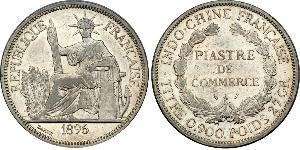
1 Piastre Indocina francese (1887-1954) ...
il gruppo ha 318 monete / 296 prezzi
Add coin to this group
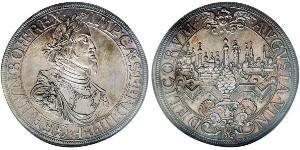
1 Thaler Augusta (Germania) (1276 - 1803 ...
il gruppo ha 63 monete / 61 prezzi
Add coin to this group
Una di queste è

